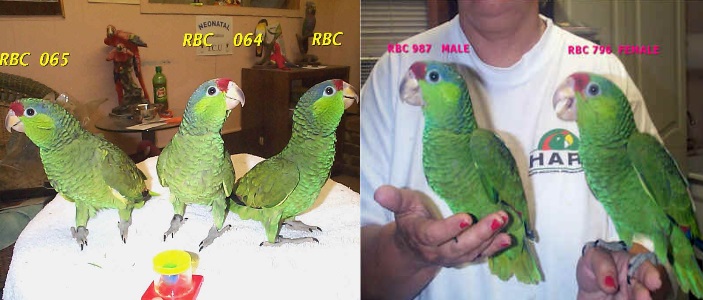Green Cheek Amazon Parrot
genus Amazona viridigenalis

CLICK HERE TO SEE ANY BABIES AVAILABLE
NO BABIES AVAILABLE
Description: Green Cheek Amazon, also known as Red Head Amazon
Green Body, Red on the forehead, crown. Blue stripe
on side of neck. Sometimes males can be more vivid colored
than females. Both have the same mimic talent.
Red heads or Green Cheek amazons are considered a
small sized amazon being around 10-12 inches but this can
vary larger or smaller. This species does not have the
extreme talents for talking like many other amazons such as
yellow naped amazons or double yellow head amazons but the
green cheek or red head has a great personality. Our handfed
baby Green Cheek Amazons are comical and entertaining. We
have had many Green Cheeks become quite talented talkers, we
believed that many birds have the talent for talking but it
is the training and mostly how the baby was raised such as
being socialized or not. All our babies are hatched and
handfed from day one. From the very beginning our babies do
not know they are birds. Green Cheek Amazons are a good
choice for someone that has smaller budgets for a bird and
cages. These birds can maintain in smaller cages better than
many other larger birds. If you want a nice smaller
amazon this bird is for you.
One of our own testimonals about Green Cheek Amazon
personality is the folowing:
As many of you have read and heard, amazons may be aggressive and sometimes mean. Well let me tell you this, all birds are moody, if you think there is one species that is the perfect bird, its just not true. You will get a nip from time to time. But there are many realities and opinions in the bird world. We sold a Green Cheek Amazon to a nice couple that wanted a smaller Amazon. When we sold them the bird, it was actually only a few weeks old and not ready to go home as we wean our birds before they leave here. As these people continued to come and visit their baby as it grew, they brought their daughter in a few times, this little girl may have been around 6-7 years old. We instructed the couple about the amazons and to make sure that they only allow the bird around the little girl supervised when they get the bird home, as this is for any bird not just amazons. Well, when the bird was weaned and ready to go home, everything was fine. After several weeks, the lady calls us and want us to take a look at their new bird, to make sure all is well.
We gave her a time to bring
it in, and when they got here, we told the lady to go ahead
and get him out of the carrier, when this little girl
suddenly opened the pet taxi and ran her little tiny arm
into the crate, we thought well she is about to get bitten,
as any bird does not like that, from anybody. The little
girl pulls out the green cheek on to her tiny arm, the bird
is making all kinds of whistles, pops, laughing and was very
excited. The bird loves this little girl, but does not like
the man or woman, only the little girl can handle the bird,
the bird will not go to anyone else without a nip.
The Green cheek Amazon is now considered endangered species and declining in numbers in their native habitat.The numbers in the USA are also going down as breeders do not have enough of breeders pairs set up for breeding in great numbers.














